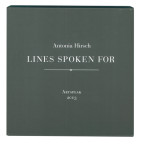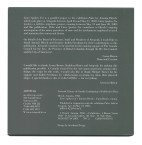Artspeak
Antonia Hirsch
Antonia Hirsch is an artist whose work has been exhibited at ZKM Museum of Contemporary Art, Karlsruhe, the Taipei Fine Arts Museum, Power Plant in Toronto, and the Contemporary Art Gallery in Vancouver, among others. Her work can be found in public collections such as that of the Vancouver Art Gallery, the National Gallery of Canada, and the Sackner Archive of Concrete and Visual Poetry, Miami Beach.
Exhibitions
-
ANTONIA HIRSCH
April 23–May 31, 2003Pulse, a new installation work, combines several elements: a pseudo-scientific tool that suggests a medical diagnostic instrument or a navigational device, echocardiographic imagery, and sound. The apparatus invites the viewer to peer into its eyepiece revealing a radar screen. As the radar beam sweeps across the scope, it becomes apparent that the radar does not reveal geographical territory, but rather rhythmically animated images of the human heart.
The audio component is a live short wave radio broadcast of Coordinated Universal Time (UTC) and is clearly audible only in close proximity to the viewing device. Every minute, a voice announcement tells the time of day in Greenwich, England, and there is a ‘tick’ for each second. This broadcast can be received in nearly all parts of the globe. UTC is one of the coordinates referenced by the Global Positioning System (GPS) and follows the standard cartographic model, which designates Europe to be at the centre of the world. In Pulse, the contractions of the heart frequently appear completely synchronized with the time signal, until both beats drift apart again.
Antonia Hirsch’s recent work investigates the many paradoxes of time and the mechanisms employed to track and maintain this consensual fiction. The history of international time zones, and the world view inherent in the politics of their implementation, have been explored previously in Recovery, in which Hirsch captured twenty-nine minutes in a Winnipeg rail yard to ‘replace’ those lost in that city’s commitment to conforming to Central Standard Time.
Pulse furthers these interests by gauging the lapse and delay between the arbitrary construct of time, the momentary failures in the systems that measure it, and the bodily and geophysical terrain where time and technology play out their mechanisms of control.
Antonia Hirsch was born in Frankfurt am Main, Germany. Based in Vancouver since 1995, she has presented solo exhibitions across Canada, most recently at Gallery 44 in Toronto and Xeno Gallery in Vancouver. She has participated in numerous group exhibitions in Europe and in Canada; in 2001 her work Empire Line was included in the comprehensive These Days exhibition at Vancouver Art Gallery. Antonia Hirsch’s work is currently on show at the Art Gallery of Mississauga and will be featured in a solo exhibition at the Kitchener Waterloo Art Gallery later this year. In 2004 her work will be seen at the Saidye Bronfman Centre for the Arts in Montréal.
The artist acknowledges the support of the Canada Council for the Arts.
Talks & Events
-
JUAN A. GAITAN, MELANIE GILLIGAN, ANTONIA HIRSCH, HADLEY + MAXWELL, CANDICE HOPKINS, OLAF NICOLAI, MONIKA SZEWCZYK, JAN VERWOERT
November 18–November 20, 2011GreyChurch Collection & Project Space, 3092 Fraser Street, Vancouver
FRIDAY, NOVEMBER 18
7pm: Antonia Hirsch
8pm: Hadley+MaxwellSATURDAY, NOVEMBER 19
11am: Melanie Gilligan
12:30pm: Lunch
1:30pm: Monika Szewczyk
3pm: Olaf Nicolai
4:30pm: Clint Burnham (Response)SUNDAY, NOVEMBER 20
11am: Juan Gaitán
12:30pm: Lunch
1:30pm: Candice Hopkins
3pm: Jan Verwoert
4:30pm: Marina Roy (Response)Respondents:
Clint Burnham and Marina RoyArtspeak and Fillip present Intangible Economies, a three-day forum that broadens the notion of economy beyond its financial dimension. Initiated by Fillip Associate Editor Antonia Hirsch, the Intangible Economies series focuses on the multifarious forms of exchange fuelled by affect and desire and speculatively investigates the fundamental role these affective transactions play in modes of representation and, accordingly, in cultural production.
The premise of Intangible Economies is the assumption that personal relationships are produced by economic activity, and that conversely, affect, and in particular desire, generates economic transactions. In the wake of recent global financial crises, it seems critical to interrogate the notion of “value” in a broader sense. Intangible Economies seeks to tackle the difficult task of tracing the role of affect in economic exchanges relative to artistic production, while also enacting the unruly force of such transactions.
Intangible Economies was initially developed through a series of texts published in Fillip magazine over the past year and will culminate in a book anthology published as part of Fillip’s ongoing Folio Series in 2012.
The Intangible Economies forum is generously hosted by Jane Irwin and Ross Hill through the GreyChurch Collection & Project Space and made possible with support from the City of Vancouver and the Canada Council for the Arts. Additional support provided by Best Western Hotels.
-
ANTONIA HIRSCH
May 31, 2003Please join us for the premiere of a new book project: Lines Spoken For, by Antonia Hirsch. This publication is produced in conjunction with her exhibition Pulse running from April 26th to May 31st, 2003 at Artspeak.
Publications
-
Title: Lines Spoken For
Category: Artist Book
Artist: Antonia Hirsch
Editor: Artspeak
Design: Judith Steedman
Publisher: Artspeak
Year published: 2003
Pages: 24 circular pages
Cover: Paperback
Binding: Single Bolt
Features: Folio Box
Dimensions: 16 x 16 x 1.5 cm
Weight: 171 g
ISBN: 0-921394-44-6
Price: $5 CDNDesigned by Judith Steedman in collaboration with Antonia Hirsch, this artist’s book uses a rotating binding system and circular pages to undo the logic of the structure of the book and remix notions of time and narrative progression. Together, the two components of Lines Spoken For contribute to Hirsch’s on-going investigation of the many paradoxes of time by questioning the consensual nature of pervasive systems regulating nearly all aspects of society.

